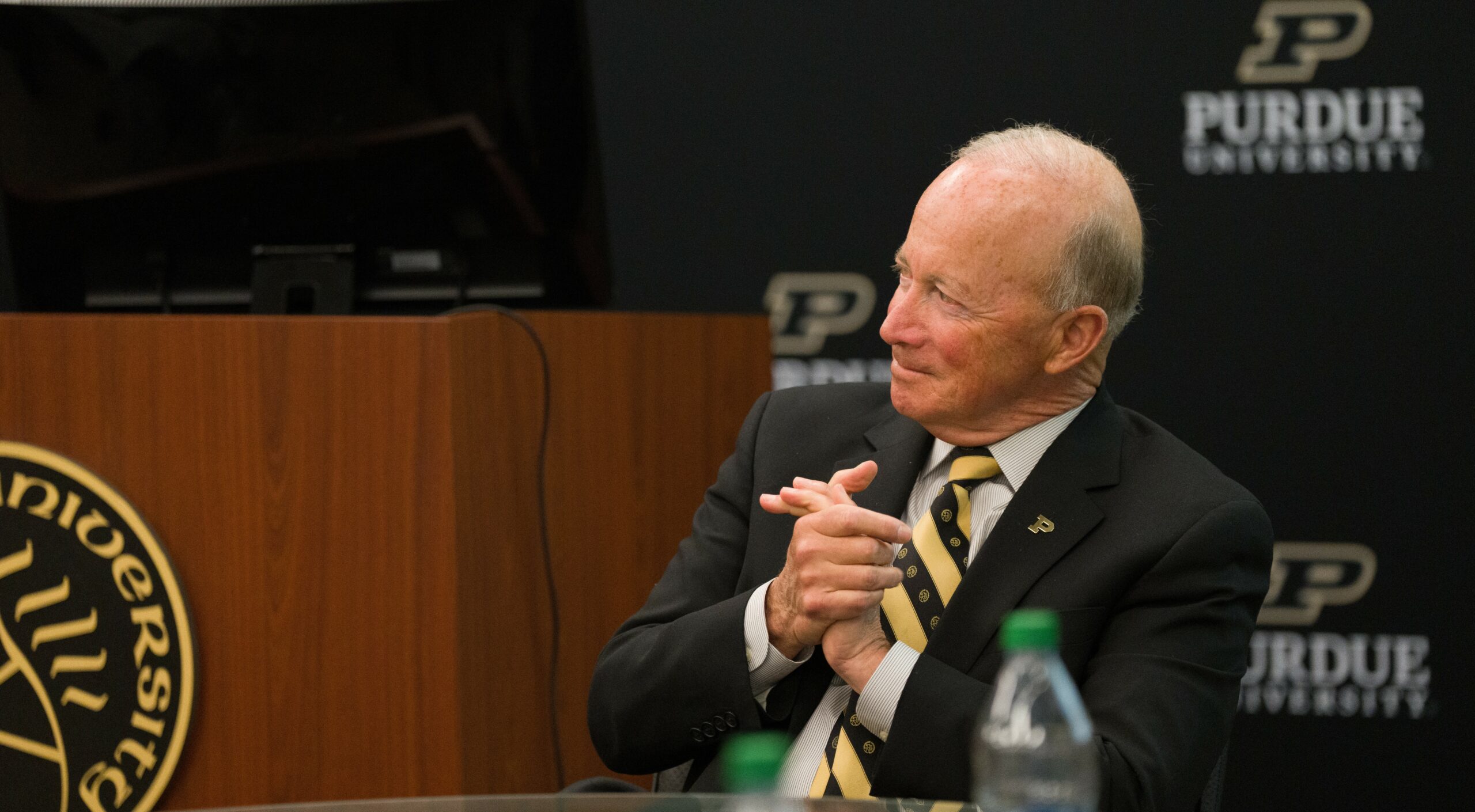A new president is taking over at Purdue University after the year ends, a pivotal shift in power given the monumental momentum built there by Mitch Daniels over the past decade, although perhaps not that shocking given the propensity lately for top higher ed leaders to retire or step down.
Daniels, who has managed to level tuition for 11 straight years and has led Purdue to national acclaim on many national rankings lists, is officially retiring and relinquishing his post to Dr. Mung Chiang, Dean of Engineering and Executive VP of Strategic Initiatives, on Jan. 1, 2023. “In all my illustrious predecessors, you won’t find one with academic credentials that match, let alone surpass, Mung’s,” Daniels said at a press conference. “Nor will you find anyone who fits the Purdue of today and its future better than Dr. Chiang does in multiple dimensions. We have here a person uniquely qualified to capitalize on the investments that we’ve made over the last decade to which I think his skill set is so ideally suited.”
Chiang, likewise, lauded the former Indiana governor for his transformational work at Purdue, which has included huge boosts to its enrollment, its endowments and its hirings. More than that, it has positioned itself among the elite research universities in the nation while cementing its position among the top 10 on innovation.
“There is no other university leader like ours,” said the 45-year-old Chiang, one of the beneficiaries of Daniels’ leadership in the engineering school. “President Daniels and the outstanding team built Purdue into the most consequential public university in the United States. Mitch is the most innovative president in America: affordability through tuition freeze, 21st-century land grant through Purdue Global, and economic growth in Indiana through entrepreneurship and the Discovery Park District in West Lafayette.”
That Daniels, 73, is stepping aside with Purdue on the rise might seem stunning, but the same could be said about dozens of presidents who have driven their universities to extraordinary heights and are walking away: Freeman Hrabowski III at the University of Maryland at Baltimore County, Lawrence Bacow at Harvard, Andrew Hamilton at NYU and Lee Bollinger at Columbia University. The past two years of the COVID pandemic, the struggle to maintain enrollments, the switch to hybrid learning, and the constant ask to forge partnerships and raise capital have been exhausting. Purdue is one of the few to rise above it all.
“Opportunities and challenges are intensifying for American higher education, from the modality and value of learning to R&D investment by the government and private sector,” Chiang said. “We are confident that the entire Purdue system, across all campuses and all units, will innovate together and excel together, one brick at a time.”
While questions remain at all of those institutions, the biggest might be whether new leaders like Chiang can step up and keep the accolades coming. He says there is no other option.
“The amazing success of the Daniels’ Decade must continue,” he said. “I’m humbled by a daunting task: to ensure the continuity of today’s momentum into the next giant leaps. I’ve had the privilege to grow the range of service as an EVP, but there’s much more that I need to keep learning. In the next seven months and beyond, my responsibilities start with listening, to students, faculty, staff, alumni, neighbors, and state, national and global partners, to all friends and families of Purdue.”

More from UB: Purdue’s growth tied to ‘keeping students at the center of bullseye’
The choice of Chiang to replace Daniels was unanimous by its Board of Trustees, and with good reason. After a sterling faculty career at Princeton University, Chiang has helped lift the university’s signature school into the top 10 nationally online (No. 3) for its graduates (No. 4) and for its undergraduates (No. 10). The university now boasts a dozen national research centers, with Chiang forging strong connections with national security and economic leaders.
“He has displayed not only academic excellence but also administrative acumen, effective relationship-building with academic, governmental and business partners, and the skills of public communications,” Board of Trustees Chairman Michael Berghoff said. “He brings the entire package of talents and experience necessary to take our university further forward. It is no surprise that Mung has been offered the presidency of several other schools, and the board is grateful that his loyalty to Purdue kept him here and available as this time of transition arrived.”
Chiang, who grew up in Hong Kong and attended Queen’s College, moved to the U.S. and received his Bachelor of Science, Master of Science and doctorate at Stanford University. Since then, he has been one of the top leaders in his field, earning 25 patents for his work while becoming a leader in cloud and video optimization, social learning networks, internet congestion and wireless scheduling. He not only took a year away from Purdue to be the Science and Technology Adviser to the U.S. Secretary of State, but he also led DataMi, a company dedicated to overcoming the lack of internet connectivity in homes. Overcoming tough odds and undaunted by his predecessors, which include a very famous astronaut, he said he is ready for his next challenge: leading the university.
“Neil Armstrong said knowledge is fundamental to all human achievement and progress,” Chiang said. “A university creates a time when lives are lifted by student access and success. My own life was lifted out of scarcity because of education. A university preserves a place for all minds in pursuit of open inquiry. As an immigrant living the American dream and as a citizen of this greatest nation in human history, I am also proud to serve in higher education as I did in the U.S. State Department, the best hope for freedom and opportunity in the ‘shining city on a hill.’ ”



